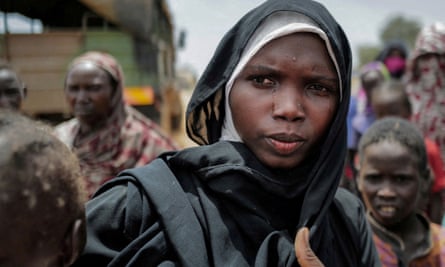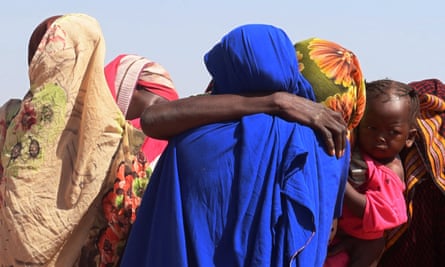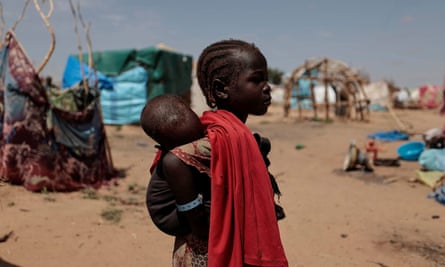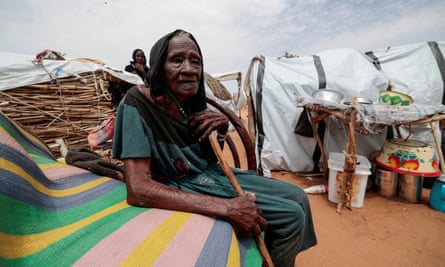G
Eneina, situated in Sudan’s West Darfur state and its capital, offers a stark contrast as if it is two distinct cities. On one hand, there are somber reminders such as mass graves, deserted military vehicles, and impoverished children. On the other hand, the city boasts vibrant restaurant scene, bustling markets, and brand-new Toyotas, locally referred to as Kenjcanjia, which translates to “stolen” due to their absence of license plates.
Since last year, when conflict began between the military and the paramilitary group known as the Rapid Support Forces (RSF), the city has experienced two significant mass killings. On both occasions, the decaying corpses were left on the streets for as long as 10 days, eventually being consumed by dogs and chickens. The remnants of the deceased can still be seen, often being walked over by individuals as they carry on with their daily routines.
Several areas in the downtown area of the city, which previously served as gathering spots for individuals displaced by conflict in other parts of Darfur, have now been deserted. Evidence of the skirmishes can be seen on the walls of buildings in the form of burn marks and bullet damage.
For two months from mid-April and then again for a week in early November, Geneina was convulsed by fighting that rapidly developed along tribal lines, pitting Masalit and other non-Arab people in support of the army against the RSF and allied Arab militia.
Over 10,000 individuals lost their lives in the city, primarily from the Masalit community. Additionally, numerous others migrated westward to Chad.
Arab militias, with the support of the RSF, blockaded the city in May. On June 15, the Masalit governor of West Darfur state, Khamis Abbakar, was reportedly tortured and killed by allies of the RSF, leading thousands of people to flee to Chad. As of June 22, the Darfur Bar Association stated that Geneina had fallen. In early November, there were additional conflicts which resulted in the remaining army garrison retreating, solidifying the RSF’s triumph in the city.
Over the past few months, information has surfaced about heinous acts carried out by the RSF and its associates in the city. On July 13th, a United Nations probe found a large number of Masalit civilians buried in a mass grave near Geneina. It is suspected that between June 13th and 21st, the RSF was responsible for their deaths.

Several members of the Masalit community chose to travel towards the perceived security of the military base near Ardamata rather than towards Chad. They reported being targeted by gunfire while on the route to Ardamata on June 13th. Fatima, who preferred not to share her full name, stated that they were suddenly confronted by Arabs who began shooting at them. She added that many people had to take cover in the river, along with their children, to avoid being hit by bullets. According to Fatima, her son sustained an injury to his arm during the incident.
“Abakar Haroun, a member of a group responsible for interring the deceased, recounted that the process took several days. He recalled a specific day when he, along with his colleagues, worked from 8am to 6pm burying individuals in a cemetery located in the al-Shati neighborhood.”
According to a woman named Samia Osman (name changed for privacy), there were a total of 117 corpses outside her house. In order to get to their own homes, they had to hop over the bodies.

Display the image in fullscreen mode.
Numerous individuals of Arab descent lost their lives during the conflict, often due to bombardment by military tanks that remain abandoned in Arab areas. An employee at the Sudanese Red Crescent, who is not Arab, mentioned that the exact number of casualties is uncertain since Arab communities handle the process of recovering bodies themselves. Emir Massar Aseel, a customary Arab leader who is accused of perpetrating atrocities against the Masalit population, alleged that the death toll is in the thousands.
The Following army’s retreat from
the Geneina area on 5 November, hundreds of Masalit individuals were tragically killed in a devastating massacre in Ardamata. According to eyewitnesses, the RSF and other allied groups systematically targeted and hunted down Masalit civilians in their homes.
According to Jamal Badawi, a tribal leader of the Masalit people in Ardamata, 236 individuals lost their lives in his region. A witness, who wishes to remain anonymous, revealed that during the burial process, the bodies were stacked on top of each other, resembling animal hides.
West Darfur state is now ruled by an administration close to the RSF. The new governor, El Tijani Karshoum, is trying to appease the population. He has called on those who fled across the Chad border to come back, offering consistent electricity and running water, often lacking in army-controlled areas, and implemented a strict night-time curfew from 7pm to 7am.
Despite the recent tragedies, the city is slowly returning to a state of normalcy. On weekends, weddings are once again taking place, and construction of homes is underway in Arab neighborhoods.

Unfortunately, the existence of children without permanent homes serves as a reminder of the recent history. A previous worker from the child protection department of the United Nations’ peacekeeping operation in Darfur stated that the majority were either parentless minors who lost their caretakers in the previous year or offspring of families who escaped to Chad but came back alone due to the unfavorable living conditions in Chad’s refugee camps.
The UN human rights office reported on Friday that both opposing forces in Sudan’s civil war have engaged in unlawful actions, potentially qualifying as war crimes. These actions include targeted assaults on non-military locations, such as hospitals, markets, and displaced person camps.
The United States has officially declared that both sides involved in the conflict have committed war crimes. They have also accused the RSF and allied militias of participating in ethnic cleansing in West Darfur. Both parties have stated their intentions to look into reports of violence and misconduct and punish any individuals found responsible.

Currently, the main risk in Geneina is airborne attacks. In an attempt to counter the progress of the Rapid Support Forces (RSF), the military has initiated bombings in areas controlled by the RSF, resulting in another wave of displacement among civilians.
Leni Christiane from the World Food Programme reported that access to RSF-controlled areas is being hindered, causing a dire situation in Sudan. She stated that the ongoing conflict has led to a catastrophic situation with millions of people facing food insecurity. Despite reports of starvation-related deaths, access obstacles are making it extremely difficult to provide urgent aid to those in need.
Source: theguardian.com


